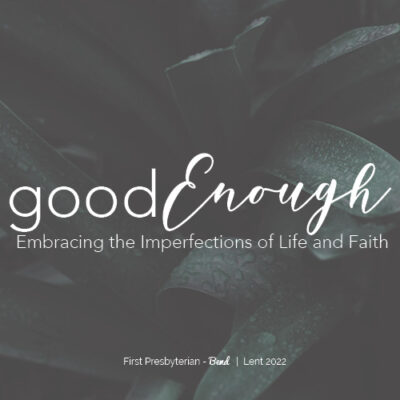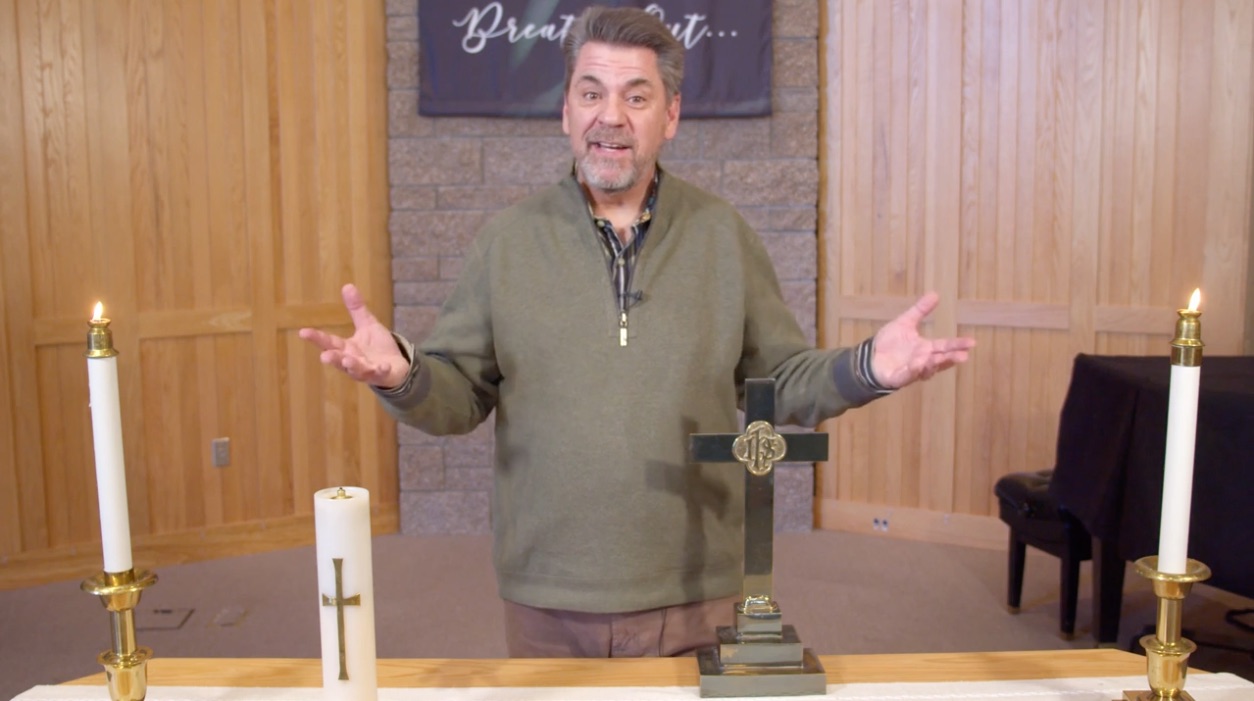Mar 13th, When So Much Is Beyond My Control, with Rev. Dr. Steven Koski
A Part of the Series:
Rev. Dr. Steven Koski
Other Articles in:
Mar 13th: When So Much Is Beyond My Control, with Rev. Dr. Steven Koski.
My favorite item in the house is the remote control for the TV. The remote in my hands gives me that feeling like I’m in charge. I can determine what’s going to happen happen if I don’t like what I’m watching. I turn the channel. I need a bathroom break.
I press pause and the action stops just for me. Don’t want to listen to that commercial. I press mute. Wouldn’t that be nice in life if you could just change the channel if you didn’t like what’s happening? Or you could press mute around certain people?
The remote gives you that wonderful illusion that you are in control until the cable goes out. Life reminds us every single day that the idea that we are in control is an illusion. The doctor shares the test results and our life changes in an instant. A loved one dies. Our child is struggling and we want to protect them from pain.
But we know we can’t. People behave in ways that we don’t understand and we can’t control. We find ourselves in the midst of the unimaginable, like a global pandemic or Russia invading Ukraine, leaving us sitting precariously on the edge of World War II. This Lenton season, we’re reading the book Good Enough by Kate Bowler and Jessica Ritchie, exploring how we might find beauty and meaning and hope in the midst of our imperfect lives that don’t go as planned or don’t turn out the way we think it should now. Last week Kelly asked, how then shall we live when faced with our own mortality?
Today’s question, how then shall we live when there’s so much of life that is out of our control? Kpole’s favorite word, it seems, is precarity, which simply means constant.
How then shall we live with precarity?
There’s no such thing as perfect. There is only life. This precarious life. I was having coffee last week with someone who apologized because she was really struggling. She was telling me that life was just too much right now.
I said there was no need to apologize for being human. Life is too much right now. I don’t think the human heart and spirit were developed to be able to hold our own trauma and the 24 hours a day news cycle of the world’s trauma. At the same time, it’s understandable your emotional circuit breakers are overloading. Mine are too.
Imagine if I asked you to just make a list of the ongoing collective and individual stressors you are carrying right now. My guess, if you made such a list, and if you looked at that list, you’d say to yourself, no wonder I feel this way. This is so much to carry.
We are all carrying so much too much. Even if we can’t take it away or change much of it, we can acknowledge what we are carrying validating why we feel so tired and overwhelmed. Jesus acknowledges the load we’re trying to carry. When he said, Come to me, all of you who are carrying heavy burdens. Yeah, that would be all of us.
There are two things I want to suggest today. Two things to help us live in the midst of life’s precarity. First, give up trying to control life. And second, focus on what you can contribute to life. You know, our instinct when there is just so much beyond our control, our instinct is to tighten our grip and try to control more, which only increases our anxiety.
Wisdom is loosening our grip. Surrendering. Recognizing being in control is an illusion. In the first peace, Jesus said, Those trying their best to save their lives, to control their lives will destroy their lives. But those willing to lose their lives, surrender their control, lose their lives for my sake, will find life.
I swim like a rock. My brothers tried to teach me to swim when I was little by throwing me in the deep end so I could learn to save myself. I nearly drowned, and I’ve been afraid of water. I’ve been just really afraid of water ever since. Several years ago, I was vacationing at a friend’s Lake cabin.
With some peer pressure, I agreed, against my better judgment, to go tubing. I convinced myself that I’d be okay because I had a life jacket. My friend loved to maneuver the boat to create these dramatic wipeouts, and he succeeded. My tube flipped out in the air, and I hit the water with such impact that my life jacket fell off. I panicked.
I began flailing my arms, and I was panicking so much that I began to hyperventilate, screaming for help, and you wouldn’t be surprised. But the more I struggled, the more difficulty. I had treading water, and I went under a couple of times, taking mouthfuls of Lake water. Another friend immediately drove in. She swam to right where I was struggling.
She was wise enough to know that if she tried to rescue me at the moment when I was struggling so hard, I’d probably pull us both under. She was alongside me, and she yelled, Stop struggling. Stop fighting, Stephen. Relax, breathe, breathe. Have you noticed I’m drowning here?
She yelled. Trust me. Trust me. I got you. Stop struggling.
She waited until I gave up struggling and fighting, trying to save myself.
And once I stopped fighting and surrendered, she placed her arms on her mind and gently led me safely back to the boat.
What an important spiritual truth to carry with us in this journey of lent. You can’t save a drowning person as long as they’re trying to save themselves, as long as they’re grasping for control.
People in recovery understand this truth more than most of us.
And honestly, if we’re honest, we are all addicted to something.
Addicted to being in control, addicted to our own way of thinking, addicted to being right, addicted to security. Addicted to avoiding life’s pain, addicted to food. Addicted to seeking people’s approval, addicted to our possessions, addicted to our ego.
The spiritual journey for all of us is letting go when we’ve reached the end of ourselves, the end of our strength, when we let go and we’re willing to die to all of our desires to insist life be the way we think it should be to be in control.
It’s there. We just might find a strength and peace that wasn’t there before.
Psalm 46 ten says, Be still and know that I am God. Now, the Hebrew word that we translate, that we typically translate as the Hebrew word is Rapha.
Rapha actually means let go, stop struggling, release, surrender. So in other words, Psalm 46 ten of the need to be in control and know that I am God. Let go of trying to be God. And you might just discover God is right there when you’re drowning in life’s. Precarity holding you up, whispering I got you.
So first, we can’t control life. And second, we can only contribute to life. I mean, life rarely goes the way we planned or the way we think it should. We control how we choose to respond to everything we can’t control. When life is spinning out of control, we can still choose to love.
I mean, Ukraine’s President Zelinsky has inspired us all with his amazing courage and resolve as a reminder to me of how precarious life is. I am hoping he’s still alive. When this recorded worship service is aired next weekend, President Zelensky was asked by a reporter about his living conditions, given his life is under constant threat. Amazingly, he said, Life is as it is. My life today is wonderful, as I believe that I am needed.
That’s the most important sense of life, that you are needed. He said, that you are not just an emptiness that breathes and walks and eats something. Wow. We can’t control life, but we can always contribute to life.
This weekend marks amazing. I can’t even believe it marks the third anniversary of taking my wife Laurie to urgent care because of the flu, with her then being airlifted to OSU in Portland, where she spent five weeks in the ICU on a ventilator precariously, peering on the edge of life and death. That experience shattered any illusion, any illusion that I had, that I was ever in control. There was one day sitting in the corner of the hospital room in Lori’s ICU room, no doubt wearing fear and anxiety on my face, when Laurie’s nurse said to me, Stephen, you’re going to drive yourself crazy trying to predict what will happen tomorrow. I know you feel helpless here in the ICU, she said.
We live in six hour installments, sometimes six minutes, sometimes 6 seconds, but we never think past 6 hours, she said. And then she said, here’s my best wisdom for you.
Live in six hour installments and focus on bringing as much love and heart and soul to those 6 hours as you possibly can. You won’t find the power of your love Wishing things were different or hoping things might be better tomorrow the presence and energy and power of your love is right here with you in this room right now.
And then she said something that changed everything for me she said something that changed that hospital room from a place of threat to a place of purpose she looked at me and said, Steven, you are helpless but you are not powerless. When fear takes over put some lotion in your hands and rub your wife’s feet and as you are rubbing her feet imagine that you’re bringing your love and the healing energy of God’s love. She knew I was a pastor imagine bringing your love and the healing energy of God’s love she said to every cell of Laurie’s being honestly that nurse saved my life that day.
I was helpless but I wasn’t powerless we can’t control life but we can contribute to life we can control how we choose to respond to everything we can’t control in six hour installments we can choose love here’s a picture this picture amazes me I just really so moved by this picture. It’s a picture of strollers just a line of strollers that Polish mothers brought to the border for the Ukrainian mothers that fled the violence of their cities carrying their children, those strollers are a picture of beauty and hope and love in the midst of life’s procarity one Polish mother who went to the border with a stroller a thermos of hot chocolate and flowers to greet Ukrainian mothers. She said when interviewed in the face of such horrific suffering, I didn’t know what to do so I did the only thing I could think of I opened my heart and extended my hand I don’t know what tomorrow will bring but today I choose love friends we can’t control or fix the world but we do change the world we do mend the torn fabric of our humanity every time we contribute to life doing the work of love that is ours to do and somehow by the Grace of God that is good enough.



